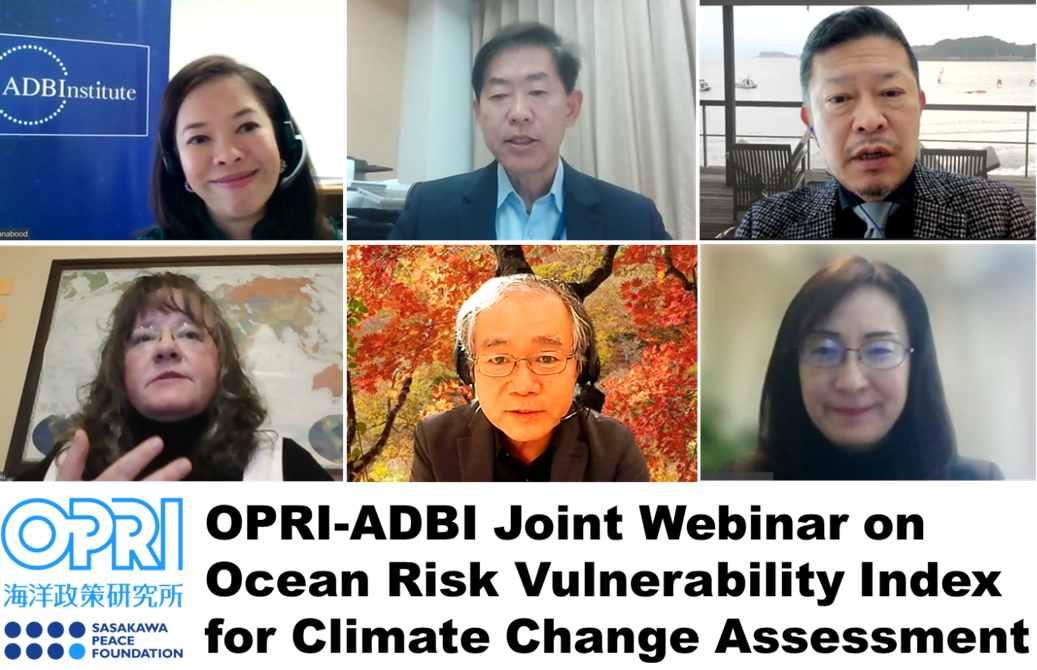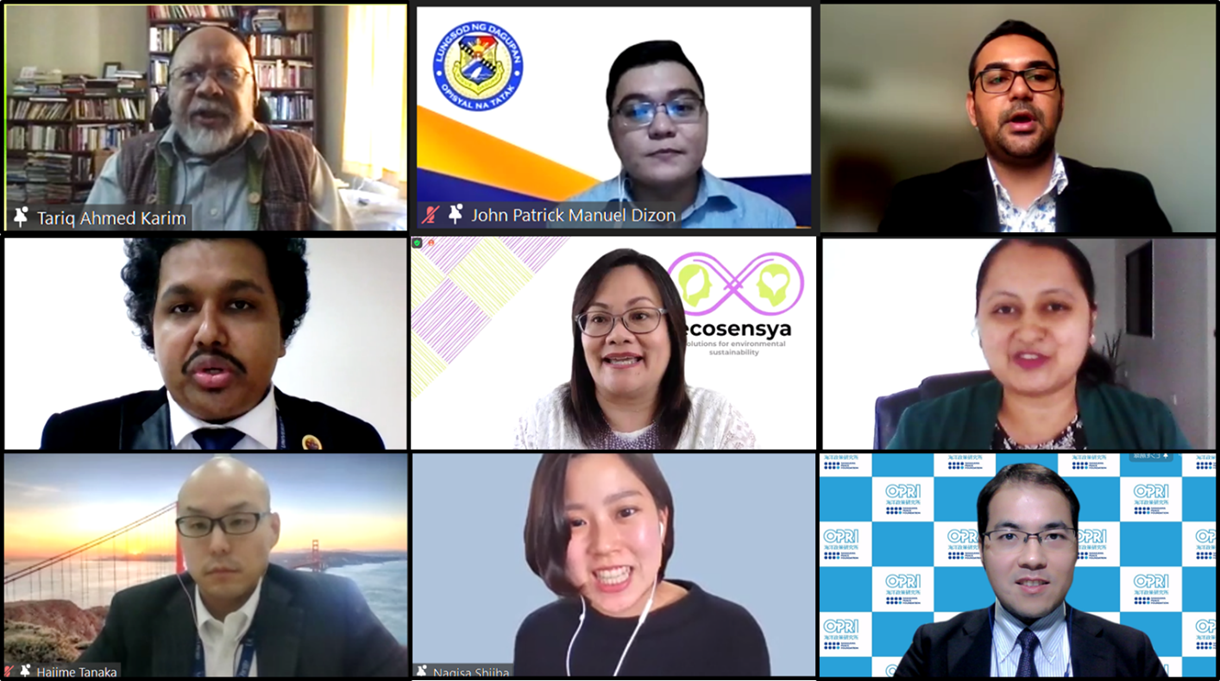News
News
[Webinar Report] OPRI-ADBI Joint Webinar on Ocean Risk Vulnerability Index for Climate Change Assessment
2021.12.07
The Ocean Policy Research Institute (OPRI) of the Sasakawa Peace Foundation, jointly with the Asia Development Bank Institute (ADBI) co-hosted a Webinar on Ocean Risk Vulnerability Index for Climate Change Assessment focusing on the case of Fiji, Bangladesh, and the Philippines on 17 November 2021. The event has gathered representatives from governments, the private sector, and the academia from countries in the Asia and the Pacific region.

Opening remarks and keynote presentation
The ADBI Deputy Dean, Seungju Baek expressed a gratitude for the collaboration working on ocean issues, emphasizing that the event is of great value in the context of the growing attention to climate issues right after the conclusion of UNFCCC COP26. OPRI President Hide Sakaguchi echoed this, and highlighted that ocean and climate change are highly correlated, while the allocation of funding indicates a great disparity for ocean conservation programs. Dr. Miko Maekawa, Senior Research Fellow of OPRI gave a keynote presentation titled “Adaptation and an Effective Decision-making Tool for Resilient Coastal Cities,” by explaining the ocean and climate change nexus, the joint initiative “the Roadmap to Oceans and Climate Action (ROCA)”, and the way forward in building more resilient and equitable coastal cities. Dr. Tomonari Akamatsu, OPRI Research Director also advocated for concrete actions by utilizing these instruments for ocean vulnerability assessment.
Since 2019, OPRI has implemented studies applying the Climate Ocean Risk Vulnerability Index (CORVI) developed by the Stimson Center with an aim to fill the data gap for better understanding and decision-making in developing coastal cities especially in Asia and Pacific region. In the past two years, the CORVI research has been conducted in multiple regions in the world, namely, the Caribbean, the Asia-Pacific, and the East Africa, despite the difficulty presented by the outbreak of COVID-19 pandemic. Ms. Tracy Rouleau, Senior Environmental Economist of the Stimson Center and President of TBD Economics gave a comprehensive introduction of CROVI methodology and the snapshots of research outcomes in the target cities.
Since 2019, OPRI has implemented studies applying the Climate Ocean Risk Vulnerability Index (CORVI) developed by the Stimson Center with an aim to fill the data gap for better understanding and decision-making in developing coastal cities especially in Asia and Pacific region. In the past two years, the CORVI research has been conducted in multiple regions in the world, namely, the Caribbean, the Asia-Pacific, and the East Africa, despite the difficulty presented by the outbreak of COVID-19 pandemic. Ms. Tracy Rouleau, Senior Environmental Economist of the Stimson Center and President of TBD Economics gave a comprehensive introduction of CROVI methodology and the snapshots of research outcomes in the target cities.

Country case study presenters and discussants during the panel discussion
Dr. Pitchaya Sirivunnabood, Capacity Building and Training Economist of ADBI chaired the session of country reports and Dr. Michael C. Huang, Research Fellow of OPRI moderated the sessions of country presentation and the panel discussion, which was participated by government officials from Bangladesh, the Philippines, and Fiji. The discussion provided inspirations, and the stakeholders found synergies by sharing their valuable experiences from different perspectives. Further details of the webinar can be accessed via ADBI website.
[Country case study presenters and discussants]
Bangladesh:
Amb. Tariq Ahmed Karim, Director, Centre for Bay of Bengal Studies, Independent University of Bangladesh (IUB)
Dr. Emadul Islam, Deputy Director, Center for Bay of Bengal Studies, IUB
Fiji:
Mr. Kushaal Raj, Acting Manager, Climate Change & Ocean, Ministry of Economy, Government of Fiji
Ms. Dhrishna Charan, Assistant Lecturer in Physics, Department of Science, University of Fiji
The Philippines:
Mr. John Patrick Dizon, Mayor’s office of Dagupan, Dagupan City, the Philippines
Ms. Antonina Lourdes E. Cunanan, Environmental Manager, Research Department, Ecosensya Solutions for Environmental Sustainability
Discussant:
Ms. Nagisa Shiiba, Policy Researcher, Adaptation and Water Area, Institute for Global Environmental Strategies (IGES)
Mr. Hajime Tanaka, Research Fellow, OPRI
[Country case study presenters and discussants]
Bangladesh:
Amb. Tariq Ahmed Karim, Director, Centre for Bay of Bengal Studies, Independent University of Bangladesh (IUB)
Dr. Emadul Islam, Deputy Director, Center for Bay of Bengal Studies, IUB
Fiji:
Mr. Kushaal Raj, Acting Manager, Climate Change & Ocean, Ministry of Economy, Government of Fiji
Ms. Dhrishna Charan, Assistant Lecturer in Physics, Department of Science, University of Fiji
The Philippines:
Mr. John Patrick Dizon, Mayor’s office of Dagupan, Dagupan City, the Philippines
Ms. Antonina Lourdes E. Cunanan, Environmental Manager, Research Department, Ecosensya Solutions for Environmental Sustainability
Discussant:
Ms. Nagisa Shiiba, Policy Researcher, Adaptation and Water Area, Institute for Global Environmental Strategies (IGES)
Mr. Hajime Tanaka, Research Fellow, OPRI